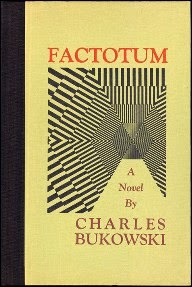I'd heard of Charles Bukowski, of course, and had read some of his poetry, but this was the first novel I read by him. It was suggested to me as a good introduction to his style. Set in the WWII and immediate post-war period, I couldn't help comparing it to Kerouac's On The Road, in that both books trace the random cross-country wanderings of unattached young men in the same historical period. There is a huge difference between the two books though, as all the youthful and romanticized enthusiasm of On The Road is totally lacking in Factotum, which is cynical and debased in tone. Factotum's protagonist, an aspiring writer, loner and total loser named Henry Chinaski, drifts across country and back, stumbling through one lousy job after another, usually drunk, engaging in hit-or-miss sexual adventures but always disdainful of the women involved. He's a loner by choice, ambition-less, except for a generalized desire to be a writer. Written in the first person in 1976, perhaps it's a thinly-disguised self-portrait?
For a review of the book by the NY Times, click here: http://www.nytimes.com/books/99/12/26/specials/bukowski-factotum.html
Here's a good source on Bukowski, compiled by NY Times: http://www.nytimes.com/books/99/12/26/specials/bukowski.html
For a review of the book by the NY Times, click here: http://www.nytimes.com/books/99/12/26/specials/bukowski-factotum.html
Here's a good source on Bukowski, compiled by NY Times: http://www.nytimes.com/books/99/12/26/specials/bukowski.html






